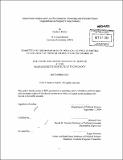Global niche markets and local development : clientelism and fairtrade farmer organizations in Paraguay's sugar industry
Author(s)
Setrini, Gustavo
DownloadFull printable version (24.80Mb)
Alternative title
Clientelism and fairtrade farmer organizations in Paraguay's sugar industry
Other Contributors
Massachusetts Institute of Technology. Dept. of Political Science.
Advisor
Michael Piore.
Terms of use
Metadata
Show full item recordAbstract
Globalization has transformed the markets in which agricultural goods are traded, placing new demands on farmers around the world. In developing countries, smallholder and peasant farmers lack many of the resources needed to upgrade their production capacities and meet new global quality standards, making them vulnerable to marginalization and exploitation. This dissertation seeks to discover the conditions that permit smallholders to upgrade in global value chains while also enhancing the voice and autonomy they exercise within their communities. To do so, it examines global niche markets for environmentally and socially responsible products. Organic agriculture favors smallholders' labor-intensive production, and Fairtrade certification explicitly attempts to leverage globalization for smallholder development. Paraguay's smallholder sugarcane farmers have been the unlikely beneficiaries of these new global market niches, as the world's largest exporters of Fairtrade and organic sugar. Two Paraguayan cane farmer organizations share similar socio-economic characteristics but have had varied success in taking advantage of Fairtrade's upgrading resources. To explain the variation between these two cases and to describe the conditions that favor smallholders' success in global niche markets, this dissertation puts forward the concept of a clientelist production network: the set of unequal social and political relationships that structure economic exchanges between farmers organizations, their leaders, and the buyers or processors that serve as their patrons. I also point out the role brokers play as "switches" for collective action and upgrading within clientelist networks. Under pluralistic clientelism multiple brokers compete with one another and are more likely to mobilize farmers collectively. This permits farmers to build new commercial and institutional relationships and to improve the accountability of their organizations, creating a basis for autonomous upgrading in global value chains. Under monopolistic clientelism farmer groups depend on a single broker. This makes brokers more likely to support a process of dependent upgrading, in which farmers confront new production costs but are less likely to enhance their share value added, to elicit greater accountability from their leaders, or to increase their autonomy from the buyers or processors that serve as their patrons.
Description
Thesis (Ph. D.)--Massachusetts Institute of Technology, Dept. of Political Science, 2011. Cataloged from PDF version of thesis. Includes bibliographical references (p. 362-372).
Date issued
2011Department
Massachusetts Institute of Technology. Department of Political SciencePublisher
Massachusetts Institute of Technology
Keywords
Political Science.